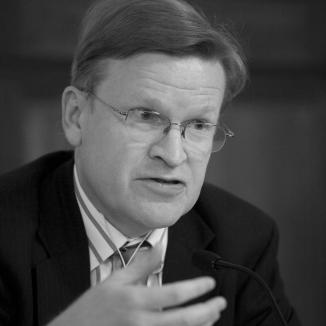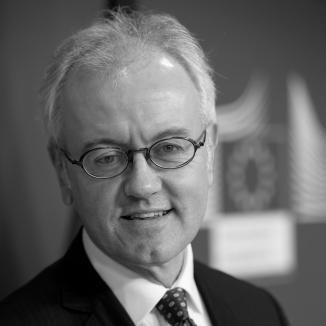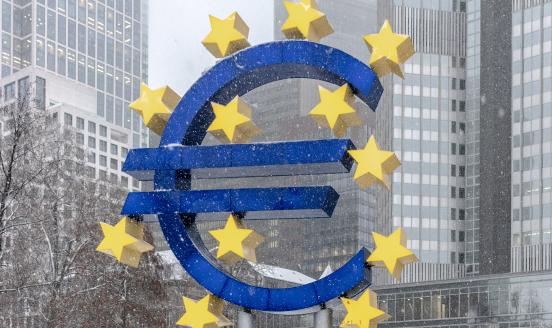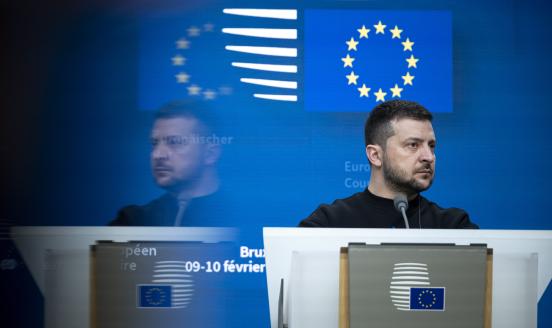The Euro and the battle of ideas
Why is the Euro in trouble? Are philosophical differences between the founding countries to blame and can those differences be reconciled?
Speakers
Markus Brunnermeier
Professor, Princeton University,
Maria Demertzis
Senior fellow
Harold James
Professor, Princeton University,
Marco Buti
Non-resident fellow
SUMMARY
See below for the video and audio and the event materials
At this event Markus Brunnermeier and Harold James presented their new book The Euro and the Battle for Ideas (co-authored with Jean-Pierre Landau). A joint work which combined not only their different backgrounds (the authors are, respectively, an economist, a historian and a former deputy governor of the Banque de France), but also their different national perspectives.
The authors outlined how the political response to the euro crisis has led to a seismic shift of power in Europe. With the notable expection of the ECB which gained significantly in stature and influence, decision-making capacity moved from European institutions to the capitals of member states, particularly Berlin and Paris. However, the differences between Northern (but above all German) and what are sometimes called Southern (but above all French) visions of the appropriate economic policy emerged with great clarity in the management of the crisis.
In this regards, the authors contested the usual way of interpreting the political dynamics as simple result of a balancing between contrasting economic interests. Conversely, since material interests are always interpreted through the lens of ideas, they claimed that we should take into account more the different economic philosophies developed in each country to fully understand the origin and the rationale of any European political dispute.
The declared attempt of the book is to trace the long-term historical, intellectual, and cultural origins of the “French” and “German” economic traditions. The authors claimed that the indeterminate cohabitation of these two traditions of economic and political thought, in addition to mutual incomprehension and national stereotyping, prevented an adequate response during the crisis and led to downward compromises on the future design of the European Union.
In terms of policy contribution, the authors supported the proposal presented in 2011 to create Euro Safe Bonds (“ESBies”), as a practical solution to permanently break the link between sovereign debt and the stability of banking sector in a manner amenable to different political (and philosophical) positions.
According to the main discussant, Marco Buti, the book provides important insights with respect to the origin and the persistence of clashing economic cultures within European project. He agreed with the opinion expressed by the authors regarding the shift towards intergovernamentalism, reclaiming, nevertheless, an active role of the European Commission during the crisis, bringing the EFSM and the Banking Union as example of important policy proposals.
He added to the discussion evidence that economic differences across EA countries widened during the first years of EMU and linked them to the increasingly diverging social and political preferences. To bridge these differences and address the transition to an enchanced European governance, he called for the parallel progress on risk sharing and risk reduction in the current phase of development of Banking and Capital Markets Union. A relevant obstacle, however, is represented by the fact that these over-present differences of economic ideas increased substantially during the crisis. After several year of digging trenches around established intellectual and theoretical propositions, Marco Buti warned that economics ideas tranformed even into ideologies, from which an open discussion in the quest for a compromise becomes more difficult. Finally, he showed interest for the proposal of the ESBies, as a good balance between the non-mutualisation concerns (German position) and the (French) necessity to address systemic risks, but it would require a nontrivial transition in the current sovereign bonds market.
A relevant comment from the audience came from Mario Monti, according to who the reciprocal interaction between European political authorities and the ECB have been somewhat underestimated by the authors (at least in their presentation). As an example of this, he recalled the importance of the decisions taken during the Euro Area Summit in 29 June 2012, which thereafter represented the political pre-conditions for Mario Draghi’s “whatever it takes” speech. Moreover, the discussions during that Summit represented another suggestive example of the battle of ideas evoked by the authors. In that context, indeed, the German position emphasizing the need to put one’s house in order first (“often falling into the fallacy of composition”) severely confronted in the quest of compromise (truly necessary at that time) with the French and others’ ones pointing more to systemic problems requiring systemic responsabilities.
In conclusion Guntram Wolff made two points. Firstly, he questioned the “shift towards intergovernmentalism” argument identified by the authors since it provided a wrong description of the events: in fact there was nothing to be shifted. What actually occurred and eventually added political tension during the crisis was the difficult creation of new mechanisms for fiscal risk-sharing across countries, which was not originally included in the Maastricht treaty. Secondly, regarding financial stability issues, he agreed on the necessity to complete the Banking Union, while arguing that the real missing part is a proper fiscal backstop, and not necessarily the ESBies.
Event notes by Filippo Biondi, Research Assistant.







